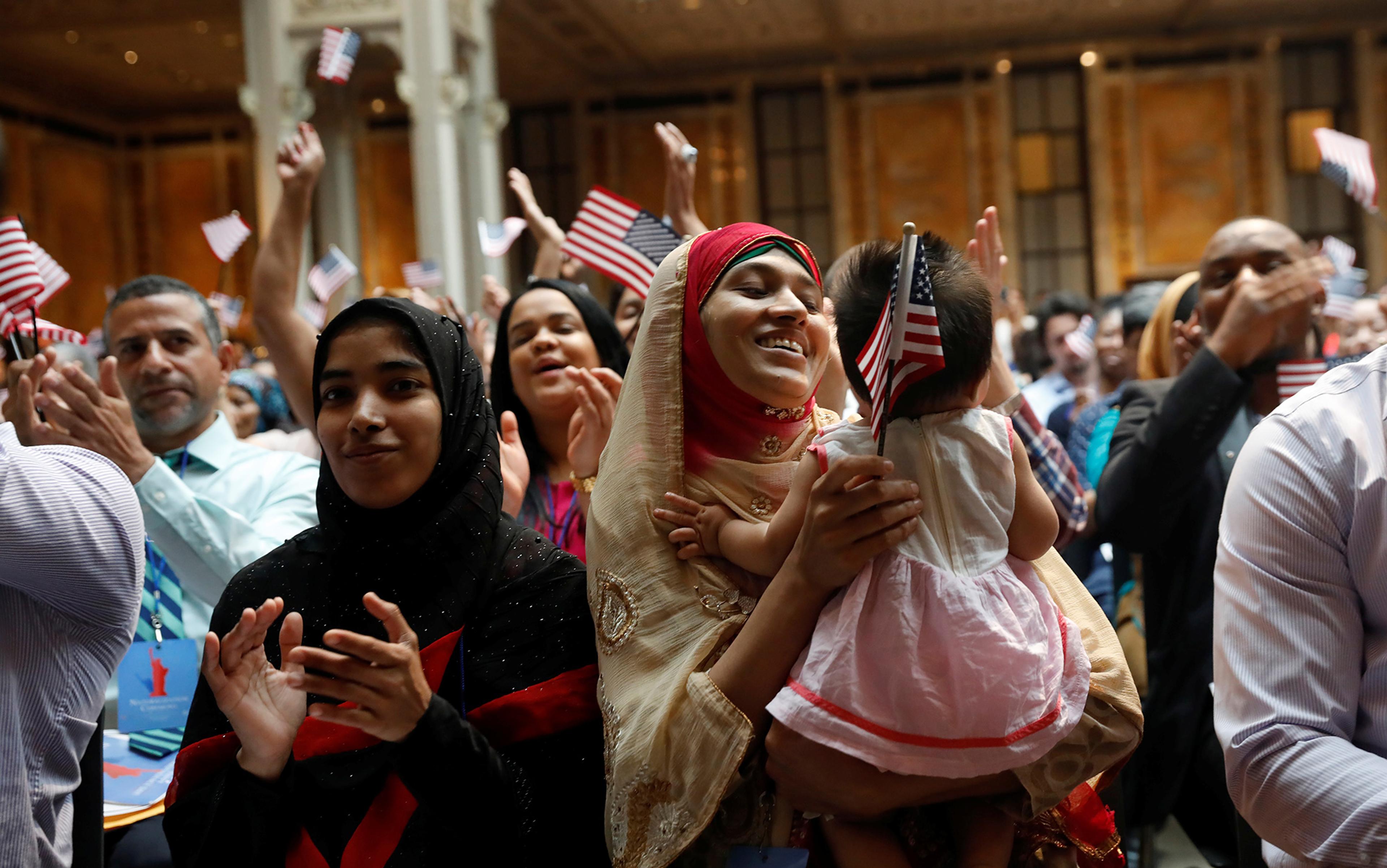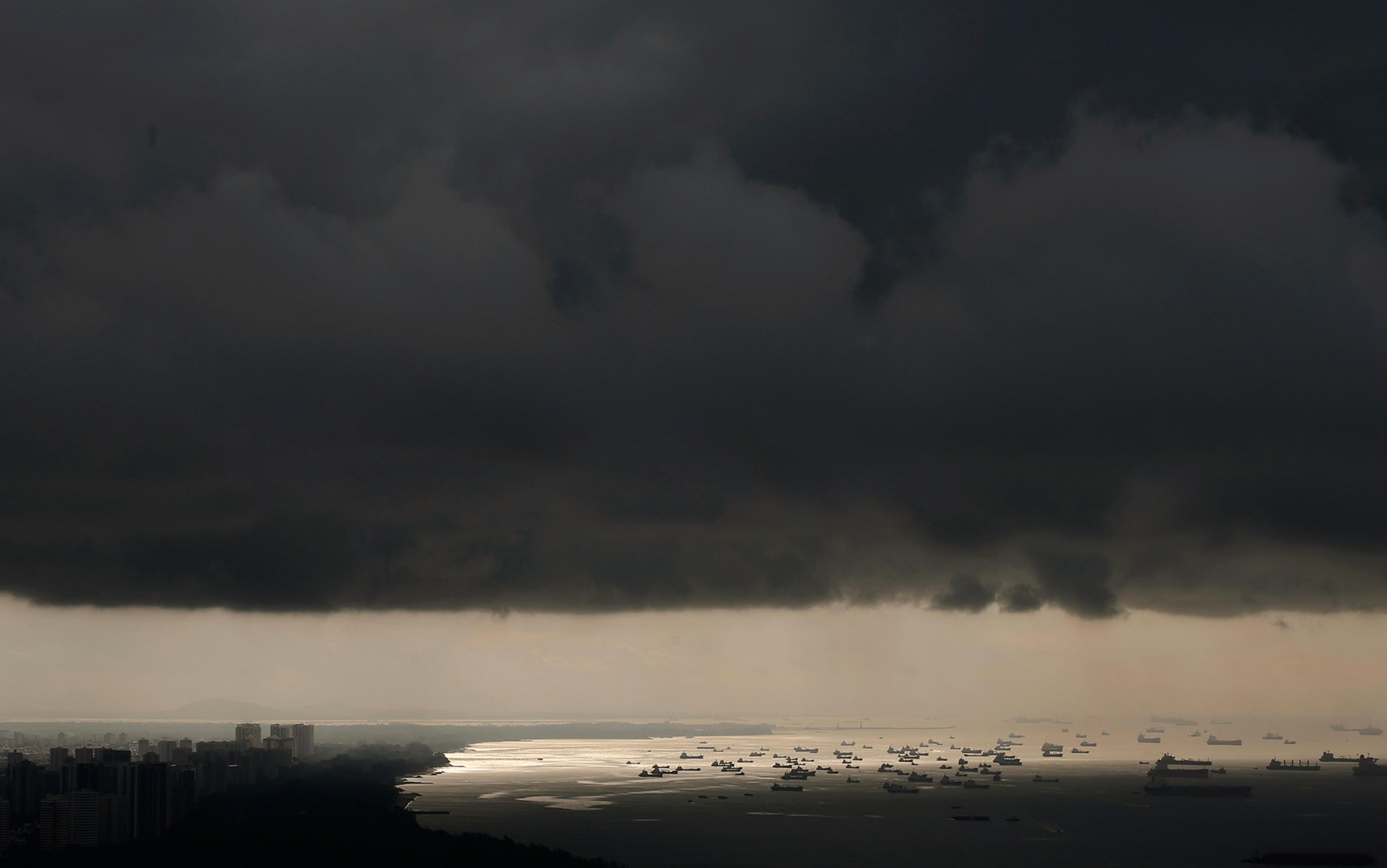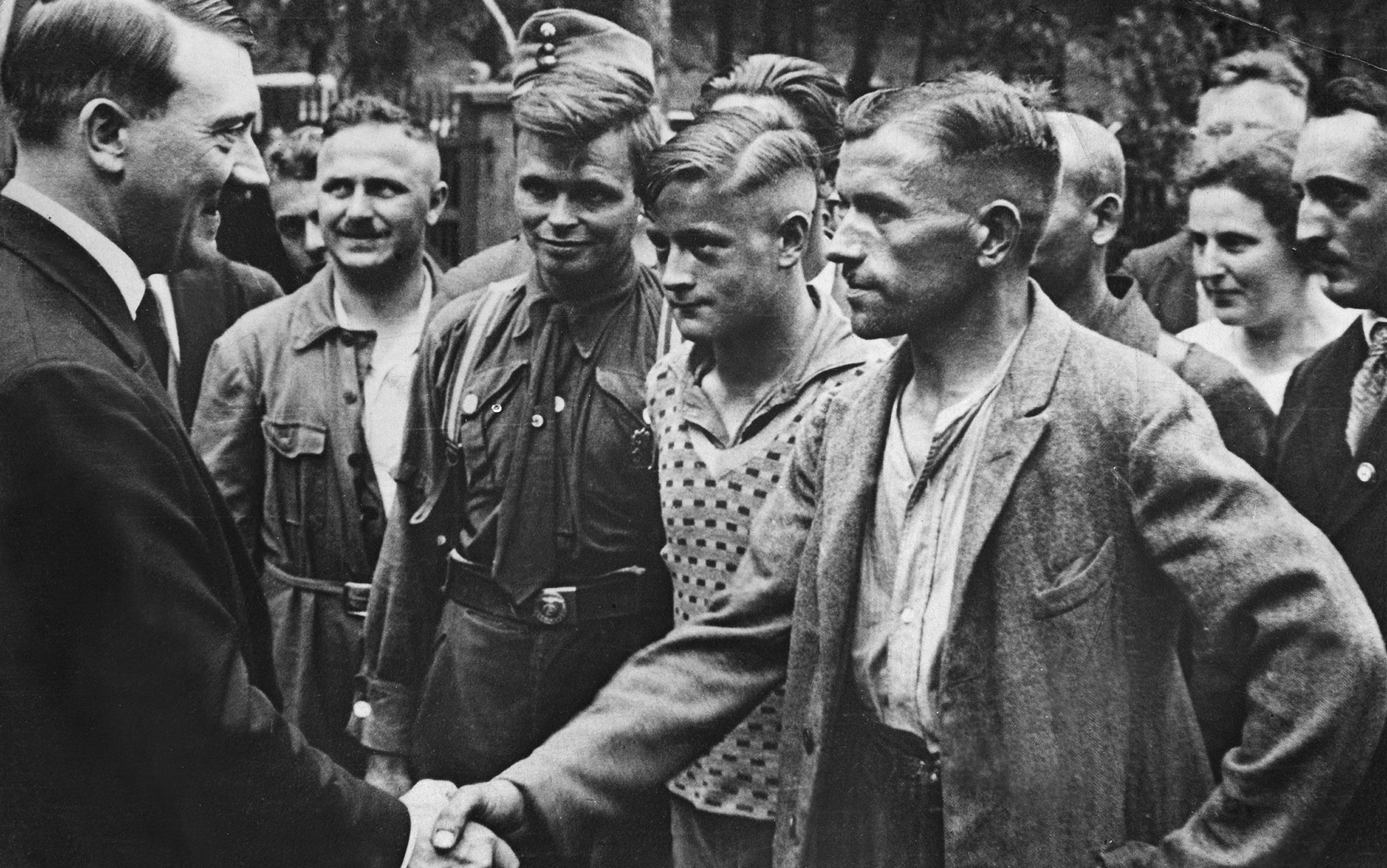It’s hard to remember that, a generation ago, pundits, bankers and scholars formed a loud chorus declaring the nation obsolete. Flows of capital, ideas and goods ushered in a global age with new metaphors and a new narrative of globalisation, movement and circulation. Now, the global promise and plotline look shopworn. The nation is back.
Lurid, ethnocentric varieties of nationalism are not the only revivals; the patria is also waxing among liberals and progressives as the community that most needs healing in order to reclaim it from the nativists. There’s a new chorus to give it the narrative uplift that the nation needs after decades of globalist neglect and recent nativist abuse. Nations need an imagined past to connect their citizens to a shared experience; nation-builders create narrative foundations upon which to raise walls and roofs. In a drive to heal – some would say, to paper over – the fractures, a new breed of chronicler has scrambled to rebuild those foundations.
Progressives might think that this reclamation is a heroic counteroffensive against nativism. In truth, it’s an admission of defeat. Not just one, but two defeats. First, as the Cold War ended, many liberals threw in their lot with the promise of a market-unified world and shed the baggage of social welfare and social democracy. Then, as globalisation began to shake after 2008, nativist backlashers seized the flag in a fight against ‘globalist’ elites and ‘menacing’ migrants. Now progressives are leaping into a mosh pit over the national storyline.
At each step, progressives went on the defensive; at each step, they gave up something. By now, there’s not much left. After 1989, they cashed in the remains of their socialist endowment. Since 2008, many are giving up their internationalist heritage. As climate change bears down on us, a global migrant crisis grows, and a nuclear arms race heats up, the chroniclers of the redeemed nation are backing away from the search for global perspectives and narratives just when we need them.
For two centuries, the nation has been the organising principle for our concept of sovereignty and tethered, from the start, to a wider order. In the 18th century, Jeremy Bentham coined the term ‘international’ to envision an entanglement of nation states to replace the disorder of predatory empires. Declarations of national independence were announcements of interdependence, of a hope to be recognised and welcomed by other nations – and thereby to secure one’s freedom – and to pledge one’s willingness to be restrained to maintain the wider order. It was so foundational to international law that it’s been taken for granted, except by colonial societies that were, by definition, excluded from recognition and freedom. When they worked, international laws and norms ensured that nations didn’t become predators. When they failed, Nation-First zealotry took over, interdependence got weaponised, and the needs of the nation authorised conquest and extermination. This is what happened in the 1930s.
The fates of nationalism and internationalism have marched together. Technological changes and the end of the Cold War marked a fundamental break that we’re still struggling to understand. They brought the final round of decolonisation to cover the planet with nations while tearing down barriers to the flow of capital and commodities, spreading nations while deepening interdependence between them. A wave of free trade agreements and mobile money brought new rituals – the World Economic Forum – and institutions – the World Trade Organization (WTO) – to celebrate connectivity, liquidity, and a hypercapitalist sense of shared time. Unbound by place, the new barons sought to ‘serve the needs of our clients all across geographic borders’, in the words of one Merrill Lynch recruiting brochure from 1994.
After two centuries of heroism and horror, the nation was out. Global was in. Patriotism was consigned to the safety valves of World Cups and pharaonic Olympic villages. Historians, myself included, got in on the act to scale up, go big, go global, and swap out stories of nations for networks, citizens for connectivity.
In an overheating and now plague-filled world, citizens are left to find shelter in the bosom of the nation
As the flat-Earth apostles gloated, the language of the nation became the rhetoric of resistance, especially in the global South where globalisation didn’t come covered with pixie dust. In Argentina, piqueteros railed against the pulverising effects of austerity for citizens and payments for creditors. Taiwanese firms moved into post-apartheid South Africa to hire dispossessed workers into their value chains, pitting trade unions and community leaders against a fledgling African National Congress (ANC) government desperate for investment. ‘We have put you in power, now you must deliver,’ cried one protestor in mid-1997 to a beleaguered ANC council. Then the discontents that were largely kept to the global peripheries came home to its cores. The economic crisis of 2008 ripped the halo off the idea of a borderless world. Since 2009, the national flag has been a worldwide emblem of resistance against cosmopolitan elites and inscrutable WTO trade-dispute panels and their technocrats.
What made the revival of the patriotic resistance so powerful was that it performed two functions at once. It was a message against ‘globalism’ and ‘Davos Man’. It also asserted a claim over who belonged to the nation in response to whipped-up fears of invading migrants and minorities. When Brexiteers such as Nigel Farage lampooned Brussels regulators, it was a warm-up act for the real show: frothing about the menace of migrants marching their way up the Balkans to invade where Napoleon and Hitler had failed before them because Europe had forsaken the idea of the nation and the ethnic majorities that stood at its guard. To rescue the British nation from ethnocide, it had to secede from Europe.
The hysteria wasn’t restricted to the endangered ‘West’. In India, the chief minister of Gujarat, Narendra Modi, was tracing the same arc. Ever since the bloody riots in Gujarat of 2002 that left around 2,000 people dead, mostly Muslims, Modi had been unofficially boycotted by European envoys. As he rose in India while Marine Le Pen and Matteo Salvini ascended in Europe, it became harder to shun Modi and his Hindutva-nationalism. In January 2013, squirming European diplomats welcomed him to a secret lunch at the German embassy. Six months later, Modi bulldozed their qualms. ‘I’m nationalist. I’m patriotic. Nothing is wrong,’ he exclaimed en route to winning the leadership of the Bharatiya Janata Party and the country’s premiership.
In a competitive, overheating and now plague-filled world, citizens have been left to find shelter in the bosom of the nation – and summoned to its defence. Universities and schools have become battlegrounds for the national narrative. In the wake of last summer’s Black Lives Matter demonstrations, the then president Donald Trump created a 1776 Commission to celebrate ‘patriotic education’. In Arkansas and elsewhere, proposed legislation would punish schools that teach the history of white supremacy as an American throughline. The Turkish government has ordered the firing of almost 6,000 disloyal academics. After the arrest of some 3,000 students in Hong Kong, Carrie Lam, Beijing’s sergeant, decried how the city’s campuses had failed to teach proper national values. ‘What is wrong with education in Hong Kong?’ she wailed. The Communist Party, meanwhile, reasserted its patriotic narrative. The city’s education secretary forbade students from singing ‘Glory to Hong Kong’, scrapped the mandatory civics course called ‘Liberal Studies’, and obligated the teaching of Chinese history. Meanwhile, libraries are being cleansed of anything that ‘endangers national security’. History textbooks must nurture ‘a sense of belonging to the country, an affection for the Chinese people, a sense of national identity, as well as awareness of a sense of responsibility for safeguarding national security.’
At the end of the summer of 1940, George Orwell entered one of his bleakest moments. The author and internationalist, who had fought alongside anarchists in Barcelona, had to reckon with the limits of his convictions once Stalin aligned with Hitler to partition the continent. After the fall of France, Orwell pronounced his conversion in the essay ‘My Country Right or Left’ (1940) and his willingness to put on a literary uniform to defend the nation. To him, the disaster at Dunkirk was more proof of the shortcomings of the British ruling class. In a later essay, he likened Britain to ‘a family with the wrong members in control’. Still, he rallied to the flag because only the nation could summon the emotions needed to fight fascism. ‘My Country Right or Left’ decried the bloodless ‘enlightened’ Left-wing intellectual class for failing to understand this; they are ‘people whose hearts have never [his emphasis] leapt at the sight of the Union Jack’ but ‘who will flinch from revolution when the moment comes’. For Orwell, what mattered was the affective power of country to defend democracy everywhere.
Orwell was aware of the risks that many current patriotic revivalists forget. Patriotic appeals work like chum in the waters of intellectual life. The sharks come out. The Right of our day want to save the nation and are willing to sacrifice democracy in its name. Wherever the nativist Right has ascended, a caste of intellectuals has swarmed to make the case for the nation. Lumping financiers, humanitarians and campus ‘activists’ together, authors such as Swapan Dasgupta of India, Jonah Goldberg of the United States and Éric Zemmour of France have been the mouthpieces of despair, proclaiming a stark choice between imminent demise or national renewal. They pose as the defenders of national heritage. The tweedy French philosopher Alain Finkielkraut, once a man of the Left, claims to have seen the light. His apostasy made him a media icon in a country that once revered Simone de Beauvoir, Albert Camus and Jean-Paul Sartre. His bestseller L’identité malheureuse, or ‘The Unhappy Identity’, (2013) warns of French decline thanks to Muslim migrants and Eurocrats in grey office blocks in Brussels. It’s not just the outsiders that concern Finkielkraut; it’s the fading patriotic spirit from within. Like his confrères elsewhere, he offers dire prophecies of self-inflicted ruin at the hands of unassimilated foreigners and multicultural natives who’ve lost their way.
Conservative nationalism pulls others into the cause of patriotic revival. Caught between Right-wing populism and the tax-free bliss of global elites, progressives have joined the fray and dimmed the appeal to internationalism; to be global has become a brand of shame.
Boast the virtues of nationalism and leave global idealists looking at a new nation chasing its own causes
Barack Obama, icon of America’s cosmopolitan self-imagery, exemplifies the dilemma of reviving the nation while retreating from the world. The biblical title of his political memoir A Promised Land (2020) underscores a theme about the tribulations of leading a nation as it loses its will to lead. As Obama rolled to victory in 2008, he reflected on W E B DuBois and the notion that American Blacks are forever condemned to a doubleness, at once Americans and Black. Obama bows to DuBois’s brilliance and ‘yet at no point had I ever questioned – or had others question – my fundamental “American-ness”.’ The signature of his ‘American-ness’ is a faith in the country’s exceptionalism, a model of liberty and welcoming for the rest. Tied to it, for good and ill, is a tradition of global leadership to reflect back its patriotic glory.
And yet Obama’s own foreign policy was shaped by his efforts to deflate expectations of what the US could do abroad while pumping loftiness at home. His opposition to the war in Iraq and his misgivings about receiving the Nobel Peace Prize, he writes, were both based on a ‘tempered belief in American exceptionalism with a humility about our ability to remake the world in our image’. This is why his realism was so confusing and ridiculed. Obama claimed to be returning to the heritage of Ronald Reagan but without the bravura that defined it. The ethical wasteland that was Trump’s creed has obscured Obama’s silence about abuses committed by Middle East autocrats, mass deportations, and publicly drawing a line in Syria – and then walking away from it.
This amalgam of lofty idealism at home and downsized realism abroad, fuelled by the need to stoke patriotic bearings for citizens and the need to deflate them for others, shows up in a recent ‘case’ for the power of nationalism to solve the global climate crisis. A British journalist at home in Washington, DC, Anatol Lieven has covered the world from Pakistan to the Baltic republics, and straddles the security-industrial complex of think-tanks, the blogosphere and academia. Now, he argues, it’s time for climate activists to ditch their utopian solidarities and seize the nation from ‘sincere’ nationalists such as Trump and Brazil’s Jair Bolsonaro, Modi and Russia’s Vladimir Putin, and see that sacrifice will work only with the appeal to the nation. This isn’t Orwell rallying to the flag for a wider cause; it’s, as Lieven puts it in Climate Change and the Nation State (2020), ‘between stupid, short-sighted versions of nationalism and intelligent, far-sighted ones’. Internationalism is nowhere in sight. Lieven considered invoking a more tempered appeal to patriotism, ‘a less controversial term’. But why fuss? Boast the virtues of muscular nationalism and leave global idealists looking at the taillights of a new nation chasing its own causes.
Idealists have also reclaimed the nation. Jill Lepore might be the most famous historian in the US. A skilled writer and scholar, she makes quirky stories reveal wider truths, and bridges the Ivy League and the elite liberal media with peerless success. Lepore has also joined the nation-building club. She wants to take it back from ethnocentrists and from the neglect of cosmopolitans, especially among the professoriate, who let the nation go mouldy because they turned their attentions to smaller and bigger things; in going global, she claims in This America: The Case for the Nation (2019), they ‘disavowed national history’. This left the nation to be snatched by ‘less scrupulous people’. In Lepore’s view, progressives abandoned the nation; the bad guys seized it. It’s time to get it back.
In the pages of magazines such as Foreign Affairs and The New Yorker, as well as in This America, Lepore wants to make the nation cool again for liberals and progressives. Her version of the nation is open, welcoming, pluralistic, civic. It binds different people together and gives them shelter irrespective of their differences. Lepore admits the wrongs of slavery and racial exclusion into the master narrative; they lend the tension and drama to the unfinished, freedom-seeking plotline.
To Lepore, reviving the patriotic narrative means burnishing the exceptionalist claims that the US is different because it was, unlike other nations, born liberal. From that formative founding moment, Lepore rescues the nation from snarling nativists because it’s the liberal narrative of the nation that makes it exceptional. Without that critical adjective, liberal, the US looks like other nations. Make America Great Again rioters might claim alone to love the country, but ‘they will be wrong’, she exclaims at the end of This America. Why? Because they spurn what makes the US exceptional; their nationalism will devour liberalism and the virtues that make the nation great. The way to be a true patriot is to be a liberal one, to share Lepore’s founding narrative.
It’s in the makeup of nations to create communions by including some while excluding others
What Lepore doesn’t say is that her liberalism can survive only if it’s safeguarded by the nation; that’s why she wants it back. She wants her readers and her students to feel as much pride waving the US flag as Trump’s legions do. The challenge is to return to the national romance and restore a collective memory of its liberality for insiders, even as outsiders recede from view.
Or are whitewashed from the narrative.
What Lepore can’t see are the exclusionary features of her liberal-nationalist imagination. American nationalism is and always has been ‘complicated’, she concedes. Her complication starts with the Thirteen Colonies that shared little in common except some visionary charters of peoplehood, such as the Articles of Confederation. But it’s in the makeup of nations to create communions by including some while excluding others. Colonies, for starters, meant conquest and colonisation. But Native peoples, Mexicans, Hawaiians and Puerto Ricans are shadows in Lepore’s account. To restore the myth of the nation ‘born liberal’, to rescue it from ethnocidal nativists, means leaving others out of the story until they become ‘immigrants’ seeking shelter from illiberalism somewhere else.
There are alternative ways to reconstitute a shared past that confront the nation’s foundational exclusions. Few Australian, New Zealander or Canadian historians would try to craft such a patriotic epic without reckoning with the history of settler colonialism. Even before hockey games, fans north of the US border listen to what are called ‘land acknowledgements’ as reminders that their ideas of sovereignty were and are contingent, that the territory underneath the ice rink was the home to other nations, and that the existence of the traditional Canadian (or Australian or New Zealander) narrative had required generations of forgetting. What’s more, the power of Indigenous claims to recognition and reparation depended on – guess what? – the global circulation of ideas of indigeneity.
Lepore would agree with Orwell. The only way to defeat illiberalism is, as she puts it, by ‘making appeals to national aims and ends’. But would Orwell agree with Lepore? I don’t think so. He’d never have seen the defence of decency and rights as one that stops at the patria’s borders. What’s more, what has prevented nations from letting their exclusionary and exterminating powers run amok has been a fluid mix of global solidarity and rivalry that holds nation states in check, braced by Bentham’s ‘international’ of which the nation is a part, not apart.
Patriotic revivalists need to square up to a paradox, and be more complicated
Those who make the case for reviving patriotic narratives aren’t just reclaiming the nation from bullies who lock up students, dismember journalists and exile intellectuals. They’re also admitting defeat. They’re in effect declaring an end to the search for narratives that reconcile membership in nations with questions of belonging to a wider order.
In 1951, Hannah Arendt made an appeal for new narratives. Herself still a refugee, a pariah who was applying for US citizenship, she told readers of The Origins of Totalitarianism that ‘only in a new political principle, in a new law on earth, whose validity this time must comprehend the whole of humanity’ will nations be restrained from their worst habits. Yes, this had to reckon with the realities of territorial nation states. But this new principle shouldn’t license us to take ‘that which was good in the past and simply call it our heritage’. The horrors of her age – and the sight of drowning refugees or the sound of orphaned children in ours – are no less real. ‘And this is why all efforts to escape from the grimness of the present into nostalgia for a still intact past, or into the anticipated oblivion of a better future, are vain,’ she wrote in her preface. For humanity’s sake, Arendt urged readers to see the nation as a necessity capable of such cruelty that it could never be entrusted on its own to do good. In the aftermath of the Holocaust and a century of imperial violence, the temptation to retreat into the comforts of nostalgia – to make any nation great again by returning to its heritage – ducked the challenge of creating narratives that transcend the false choice of belonging either to a nation or to a world that makes that nation possible.
Patriotic revivalists – if they want to improve their ‘case’ – need to square up to a paradox, and be more complicated. The world needs nations to do good things, such as reduce carbon emissions and stop treating stateless people as less human. To do good things, nations have to be good. But the condition for the existence of good nations is other good nations doing good things for each other – and for those who’ve had their homes taken away because their nations haven’t been good. Why not start there in the quest for new stories of nations for a new global age?






